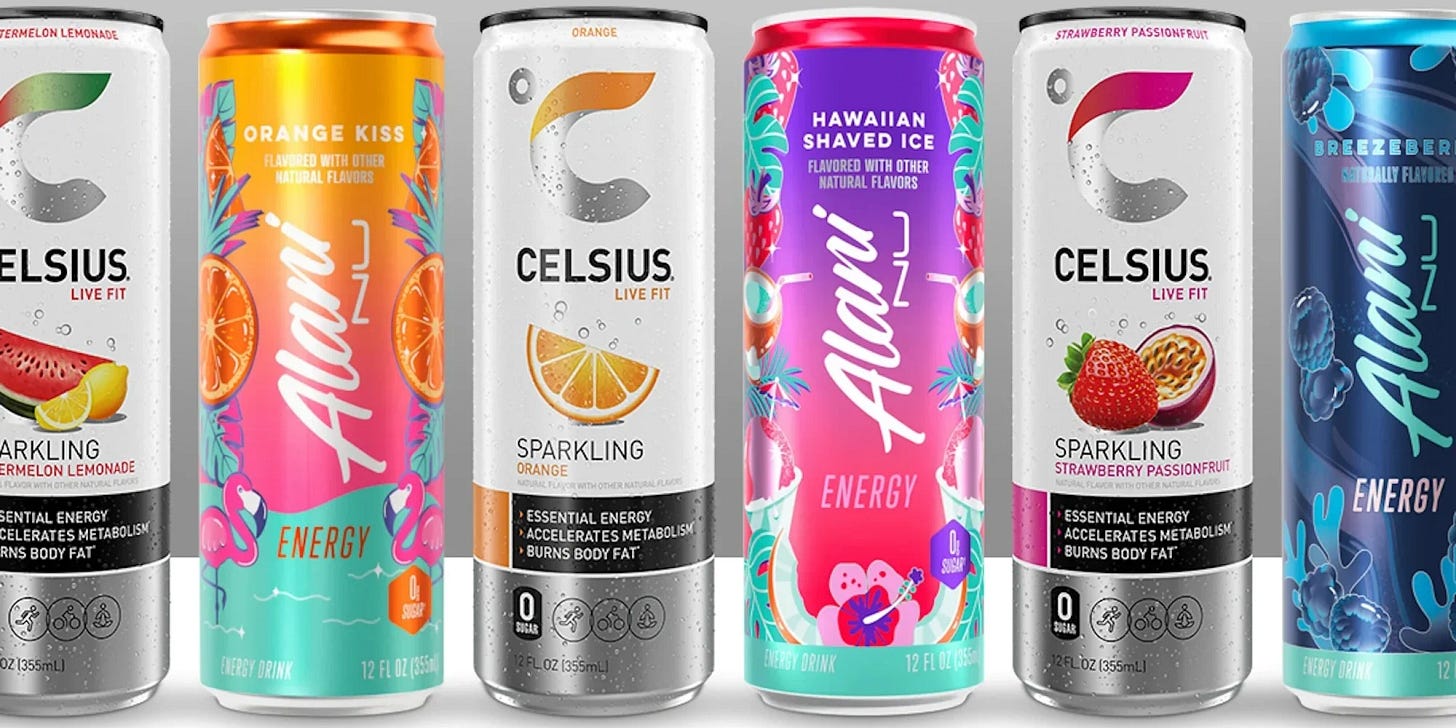Celsius: The Energy Drink Disruptor Taking on Red Bull & Monster
Celsius is redefining energy drinks with a sugar-free, fitness-focused boost, high caffeine, no crash!
Celsius Holdings is storming the $70 billion energy drink market, leaving behind sugar heavy competitors like Red Bull. With a health focused, performance driven approach, Celsius offers a sugar-free, low calorie formula packed with metabolism boosting ingredients like green tea extract and B vitamins a top choice for fitness conscious consumers.
Boasting 20 to 30% revenue growth in 2024 and fueled by strong influencer marketing, Celsius is rapidly expanding its global footprint.
As it enters new markets like Belgium and Luxembourg, Celsius continues to leverage its premium branding and strong market positioning to attract health conscious consumers. With its unique blend of functionality and fitness appeal, the brand is solidifying itself as a major player in the evolving energy drink landscape.
Overview
Today, I’ll talk about the following:
How Celsius turned energy drinks into a cash machine
The secret sauce behind celsius’ explosive growth
Why Celsius’ money making machine keeps humming
The genius moves fueling Celsius’ global takeover
The dark side of Celsius’ winning formula
What’s next for Celsius’ cash printing empire?
The Bottom Line: Celsius’ business model is a beast
Caffeine Comparison
Final Thoughts
How Celsius turned energy drinks into a cash machine: The big picture
Celsius Holdings, Inc. is a global powerhouse in the performance energy drink game, with its flagship Celsius brand shaking up the $60-70 billion market.
It’s not just another sugary buzz in a can, Celsius pitches itself as the “better for you” hero with zero sugar, metabolism boosting ingredients, and a vitamin packed punch.
The 2024 acquisition of Alani Nu, a trendy sports nutrition brand, turbocharged its portfolio, targeting fitness buffs, millennials, and Gen Z. Operating in 30+ markets, Celsius dominates North America while planting seeds worldwide.
But how does it actually make money? Let’s peel back the curtain on its slick business model.
The secret sauce behind Celsius’ explosive growth
Celsius’ business model is a masterclass in riding consumer trends and leveraging partnerships. Here’s the breakdown:
Premium product, premium price
CELSIUS isn’t cheap and that’s the point. It’s marketed as a lifestyle choice, not a commodity (this doesn’t take away the fact that it still is a commodity though haha).
Prices of top 3 energy drinks (on average for a single can):
Redbull - 2.85 dollars
Monster - 2.70 dollars
Celsius - 2.25 dollars
In bulk, Monster is the most affordable of the three above.
Zero sugar, clean label ingredients, and functional claims (think metabolism boosts) justify the premium, targeting health conscious buyers willing to pay up.
Alani Nu follows suit, with its pastel cans and influencer appeal commanding top dollar in the $20 billion sports nutrition space.
Outsourced everything (except the brand)
Celsius doesn’t own factories or bottling plants, it outsources production to co-packers, slashing capital costs and keeping the balance sheet lean. This asset-light approach means low overhead and high flexibility, with gross margins likely hovering at 45-50%. The company focuses its energy on branding, marketing, and innovation instead of heavy machinery.
I should add that, in November 2024, Celsius acquired Big Beverages Contract Manufacturing. This is a co-packing partner. They acquired it for $75 million. This strategic acquisition gave Celsius access to a 170,000-square-foot manufacturing and warehouse facility in Charlotte, North Carolina, significantly enhancing its production capabilities and supply chain control.
PepsiCo: The distribution cheat code
Since 2022, Celsius has leaned on PepsiCo (an 8.5% shareholder) to muscle its way into every convenience store, gym, and Walmart imaginable. This partnership isn’t just a handshake, PepsiCo’s logistics network has boosted North American distribution points by 15 to 20% in 2024 alone, cutting shipping costs and amplifying reach. Celsius keeps control of its brand and margins, letting PepsiCo handle the grunt work.
Sell the vibe, not just the drink
Marketing is the engine driving Celsius’ growth. The brand invests heavily in social media, fitness influencers, and gym partnerships to cultivate a loyal, lifestyle-driven community.
Alani Nu takes it a step further with TikTok-friendly branding and campaigns tailored to female consumers, turning everyday buyers into passionate brand ambassadors.
The payoff? A wave of organic buzz that fuels trial, drives repeat purchases, and builds momentum. Without having to rely on deep discounts or traditional retail promotions.
Why Celsius’ money making machine keeps humming
The business model isn’t just clever, it’s a profit engine.
Here’s how it pays off:
High margins, no debt
Outsourcing production and premium pricing deliver fat gross margins (45 to 50%), while operating margins likely hit 15 to 20% after marketing and distribution costs.
With zero debt, Celsius avoids interest payments, keeping more cash in its pocket. FCF is a gusher, perfect for funding growth or the $1.8 billion Alani Nu buyout in 2024. (Net: $1.65 billion, apparently a 16.5x EBITDA for the Alani Nu business)
Cash and equivalents: $890 million
Debt: $20 million
FCF: $240 million
Scalability on Steroids
The asset-light setup lets Celsius scale fast without sinking cash into infrastructure.
Adding a new flavor or entering a new market? Just tweak the recipe and tap PepsiCo’s network.
International revenue jumped 50%+ in 2024 (from a small base), proving the model’s global potential.
Diversified bets with Alani Nu
Acquiring Alani Nu wasn’t cheap, but it’s a clear game changer.
They acquired Alani Nu in a strategic move to strengthen its position in the health-conscious energy drink market. The acquisition, finalized in April 2025, was valued at $1.8 billion and included $150 million in tax assets, resulting in a net purchase price of $1.65 billion. The deal was structured as a combination of cash and stock, with an additional potential earn-out of $25 million based on Alani Nu's performance in 2025 .
Alani Nu, co-founded by Katy and Haydn Schneider and operated by Congo Brands' co-founders Max Clemons and Trey Steiger, has built a strong portfolio of health and wellness lifestyle products. The brand is particularly popular among female consumers and offers a range of products, including energy drinks, protein powders, and snacks.
By integrating Alani Nu into its operations, Celsius aims to expand its reach to new consumer segments and enhance its product offerings in the functional beverage space.
This acquisition is expected to be accretive to Celsius's earnings per share in the first full year of ownership and is projected to generate approximately $50 million in run-rate cost synergies over two years post-close .
Celsius financed the Alani Nu acquisition through a smart combination of cash reserves, equity, and strategic debt, while also including a performance-based component to manage risk. This capital structure keeps Celsius nimble and growth-focused without overextending financially.
Recurring revenue dream
Energy drinks thrive on habit. Celsius’ focus on daily use occasions (pre-workout, afternoon pick me up) locks in repeat buyers. Loyalty programs and limited edition drops keep the hype alive, turning one-time sippers into lifelong fans.
The genius moves fueling Celsius’ global takeover
Celsius doesn’t sit still, it’s business model thrives on strategic plays:
PepsiCo partnership power
Beyond distribution, PepsiCo’s clout opens doors to club channels (Costco, Sam’s Club) and mass retailers, where Celsius snagged 5 to 7% market share in North America by 2024. This deal slashes customer acquisition costs and boosts visibility.
International Hustle
In 2024, Celsius pushed into Europe and Asia-Pacific with localized flavors and lean distribution. International sales are still small (10 to 15% of revenue), but the model’s portability, light assets, strong partners sets up a 20 to 25% revenue share by 2027.
Innovation on Overdrive
New CELSIUS flavors and Alani Nu’s functional snacks keep shelves fresh and consumers hooked. R&D is lean but laser focused on clean label trends, ensuring the brand stays ahead of the “healthier energy” curve.
Acquisition Playbook
Alani Nu’s success hints at a repeatable M&A strategy snap up fast growing, synergistic brands to widen the moat. With no debt and strong FCF, Celsius has the firepower to strike again.
The Dark Side of Celsius’ Winning Formula
No model’s perfect, here’s where Celsius could stumble:
Premium price peril
Charging more works until wallets tighten. Economic slowdowns in 2025 could push consumers to cheaper rivals or private label knockoffs, testing brand loyalty.
PepsiCo dependency
Leaning on PepsiCo is a strength until it’s not. If the partnership sours or PepsiCo prioritizes its own brands (like Rockstar), Celsius’ growth could stall.
Innovation fatigue
Constant flavor drops and product launches keep fans buzzing, but misfires or oversaturation could dilute the brand’s edge. R&D must always stay sharp and must keep on improving.
Regulatory headaches
Metabolism claims and caffeine levels invite scrutiny. Tighter rules in key markets could force costly reformulations or marketing pivots. For example, Celsius is working to expand its presence in Europe, but different regulations compared to the U.S. make it harder for the brand to immediately compete on equal footing with established players.
What’s next for Celsius’ cash printing empire?
Celsius’ business model is built to last and grow. Revenue could hit $2-2.5 billion in 2025 (20-25% growth), with Alani Nu kicking in 20 to 25% of the total. Margins should climb toward 20 to 25% as international scale kicks in.
The debt-free war chest and PepsiCo’s muscle give Celsius room to dominate the “better-for-you” niche, potentially eyeing a top 2 spot in performance energy by 2030.
But it’s not all smooth sipping, competition from Monster, Red Bull, and newbies like Ghost looms large, and execution will make or break the next chapter.
The Bottom Line: Celsius’ business model is a beast
Celsius Holdings has cracked the code: premium products, outsourced grunt work, a powerhouse partner in PepsiCo, and relentless marketing. It’s a lean, mean, profit generating machine that turns fitness trends into cold, hard cash.
Alani Nu supercharges the playbook, diversifying the bet while keeping the model intact. Risks like price sensitivity and regulatory curveballs lurk, but with no debt and a scalable framework, Celsius is poised to keep pouring profits.
Investors and rivals alike should watch this one, it’s not just an energy drink company. It’s a lifestyle juggernaut.
Caffeine Comparison: Celsius vs. Red Bull vs. Monster vs. Coffee
When it comes to choosing an energy boost, let's break down the key differences in these popular drinks per 250ml serving (small can):
Health & compliance considerations
Celsius packs more caffeine than Red Bull or Monster in a 250ml serving.
While Red Bull and Monster are high in sugar, Celsius is both low-calorie and sugar-free.
Black coffee remains the most natural choice, with no additives.
EU compliance details
The EU enforces specific regulations for energy drinks:
Caffeine content limit: Energy drinks are limited to a maximum of 320 mg of caffeine per liter.
Mandatory labeling: Beverages containing more than 150 mg of caffeine per liter must display a warning label stating “High caffeine content,” and advise that they are not recommended for children, pregnant, or breastfeeding women.
Celsius packs a powerful 200mg of caffeine in every 355ml can, which adds up to a whopping 563mg/L!
And here's the catch: per EU rules, any energy drink sold on the market must be limited to a maximum of 320 mg of caffeine per liter. And if the drink contains more than 150mg of caffeine per liter, it must include a "High caffeine” warning. Which says that its not recommended for children or pregnant or breastfeeding women.
This means Celsius will not only need to prominently display this on its packaging when sold across Europe, but they’ll also have to comply on the caffeine content limit.
On top of that, some EU countries may have even stricter rules on high-caffeine drinks, so Celsius will need to stay on top of those. While the brand promotes a health conscious image with its sugar free and preservative free formula, that caffeine hit still demands clear labeling to meet EU safety standards.
Final Thoughts
Celsius isn’t just riding the wave of the energy drink boom, it’s creating its own category. With a health forward identity, sleek branding, and strategic partnerships, it has built a business model that’s lean, scalable, and deeply aligned with what modern consumers want. It’s not just an energy drink, it’s a lifestyle product with a cult like following.
The company has nailed the formula: high margins, strong branding, smart distribution thanks to PepsiCo, and a relentless focus on growth markets. Its acquisition of Alani Nu further diversifies the portfolio and adds another dimension to its health and fitness play.
That said, this rocket ship isn’t without risk. Dependence on PepsiCo, rising competition from incumbents like Monster and Red Bull, and tougher regulatory environments, especially in the EU, it could test its resilience. But Celsius' ability to adapt, market, and scale quickly puts it in a strong position to weather those storms.
If you’re watching the future of the energy drink space or investing in companies riding long term health and wellness trends. Celsius deserves a front-row seat. Its business model isn’t just profitable, it’s adaptable. And with new markets opening up and Alani Nu powering a broader wellness strategy, this isn’t just a fad. It's a blueprint for building a next-gen consumer powerhouse.
Whether you're an investor, a competitor, or just someone sipping the hype, Celsius isn’t slowing down. It’s only getting started.
Ready to dig deeper? SUBSCRIBE for FREE insights on Celsius Holdings and other growing companies. Don’t miss the next major opportunity, JOIN our community of informed readers today!
Disclaimer:
The content of this analysis is for informational purposes only and should not be considered financial or investment advice. The opinions expressed are my own and based on publicly available information at the time of writing. Before making any investment decisions, please conduct your own research or consult with a professional financial advisor to assess your individual situation. Investing in the stock market involves risk, and past performance is not indicative of future results.














Celsius $CELH is one of the companies that held up during the market sell off.
It stayed above both the 50-day and 200-day moving averages.
Keep an eye on this one.